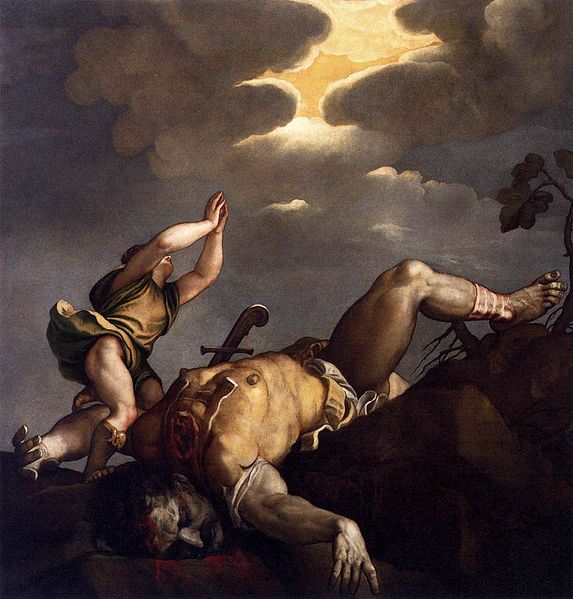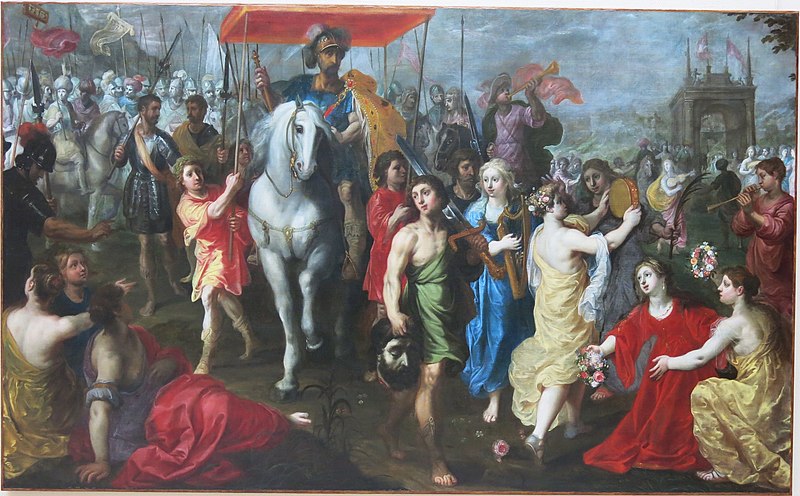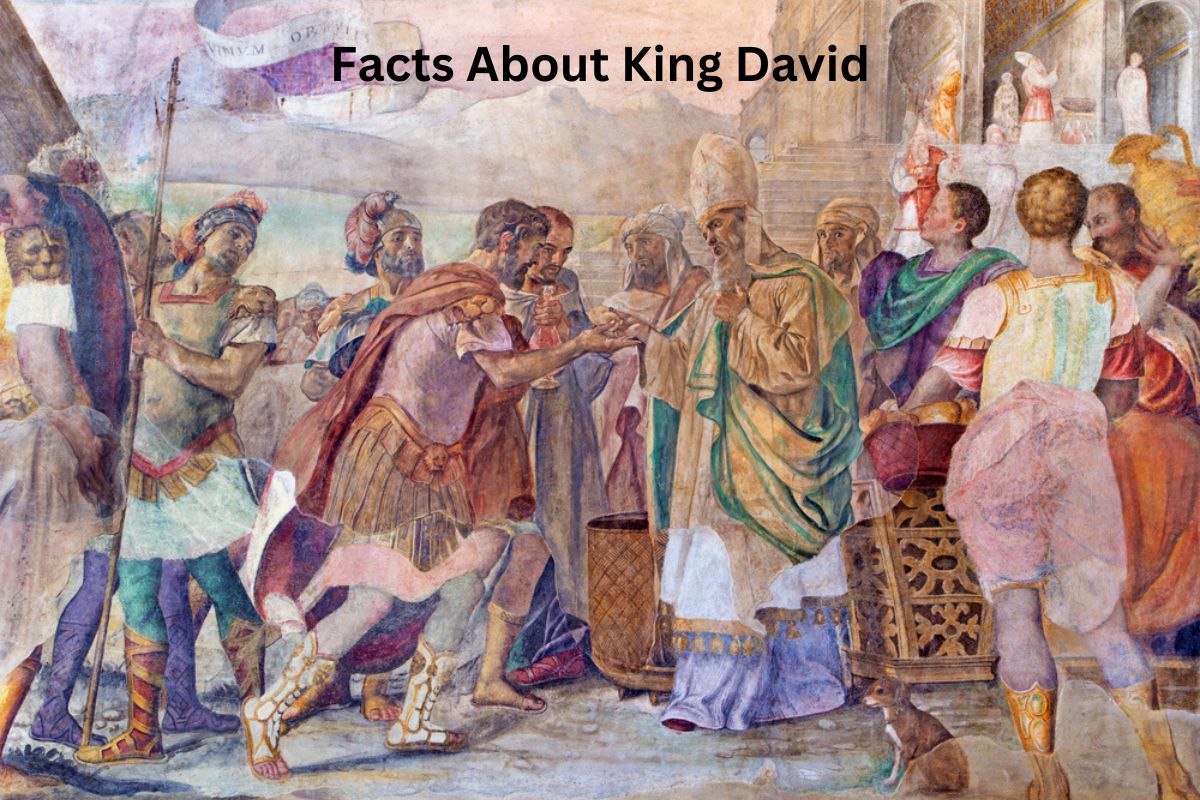King David, a prominent figure in biblical history, is revered in Judaism, Christianity, and Islam.
His life is characterized by a series of remarkable achievements and challenges, from his anointing as king and legendary victory over Goliath to his establishment of Jerusalem as the capital of a united Israel.
David’s complex character, marked by his deep friendship with Jonathan, his moral failings, and his role as a musician and poet, has left an enduring legacy that transcends his historical era.
King David Facts
1. Anointed by Samuel
King David’s journey to the throne began when the prophet Samuel was instructed by God to anoint him as the future king of Israel.
This anointing took place in Bethlehem, David’s hometown, while he was still a young shepherd. It marked the divine selection of David as Saul’s successor and set the stage for his rise to power.

2. Defeated Goliath
The story of David and Goliath is one of the most well-known episodes in the Bible. Goliath was a Philistine warrior of formidable stature, and he challenged the Israelites to send out a champion for single combat to settle a standoff between the two armies.
Also Read: Timeline of King David in the Bible
David, who was initially sent by his father to bring food to his older brothers in the Israelite camp, volunteered to face Goliath. Armed only with a sling and a few stones, David confronted and defeated Goliath with a well-aimed shot to the forehead.
This courageous act not only saved the Israelites but also established David’s reputation as a brave and capable leader.
3. Musician and poet
David was not only a warrior but also a skilled musician and poet. He played the harp and composed many of the Psalms found in the Bible’s Book of Psalms.
These Psalms are a collection of songs, prayers, and poems that express a wide range of emotions, including praise, thanksgiving, lament, and supplication.
Also Read: King Saul Timeline
David’s musical and poetic talents were not only a source of personal expression but also played a significant role in his relationship with God and in the worship of the Israelites.

4. Friendship with Jonathan
David had a remarkable and deep friendship with Jonathan, the son of King Saul. Their bond was forged during a challenging time when David was serving in Saul’s court. Despite Saul’s jealousy and attempts to harm David, Jonathan remained loyal to his friend.
The Bible describes their friendship as one characterized by love and mutual support. In 1 Samuel 18:1-4, it says, “the soul of Jonathan was knit to the soul of David, and Jonathan loved him as his own soul.”
Jonathan’s loyalty to David even extended to warning him of his father’s intentions and helping him escape danger.
5. Davidic Covenant
The Davidic Covenant is a significant promise made by God to King David. According to this covenant, God assured David that his descendants would rule over Israel forever.
This promise included the guarantee of an everlasting dynasty, with one of David’s descendants continuing to sit on the throne of Israel.
This covenant is a central concept in biblical theology, and it plays a crucial role in the prophetic anticipation of the Messiah, as Jesus Christ is often referred to as the “Son of David” in the New Testament.
6. United Kingdom of Israel
Before David’s reign, Israel was a collection of tribes with varying degrees of autonomy. David is credited with unifying these tribes into a single, cohesive kingdom known as the United Kingdom of Israel.
Under his leadership, he established a centralized government and military, which brought stability and strength to the nation. Jerusalem, the city he conquered from the Jebusites, became the capital of this united kingdom.
David’s ability to consolidate power and unite the tribes was a significant achievement in Israel’s history and laid the foundation for a more centralized monarchy.

7. Military conquests
During his reign as king, David led several successful military campaigns that expanded the territory and influence of the United Kingdom of Israel.
Some of his notable conquests included the defeat of the Philistines, Moabites, Ammonites, and the Edomites. His military successes allowed Israel to establish itself as a regional power in the ancient Near East.
8. Jerusalem as the capital
One of King David’s most significant achievements was capturing the city of Jerusalem and making it the political and religious capital of Israel. Jerusalem’s strategic location and natural defenses made it a prized possession.
David’s capture of the city from the Jebusites is a pivotal moment in his reign. He then brought the Ark of the Covenant, which represented God’s presence, into Jerusalem, signifying the city’s newfound importance in Israelite religious life.
9. Bathsheba affair
Despite his many accomplishments, David’s reign was not without its share of controversy and moral dilemmas. The most infamous incident is the affair he had with Bathsheba, the wife of Uriah the Hittite, one of his loyal soldiers.
After Bathsheba became pregnant, David attempted to cover up the affair by arranging for Uriah’s death in battle. The prophet Nathan later confronted David, leading to his deep repentance and the acknowledgment of his wrongdoing.
This episode serves as a cautionary tale about the consequences of sin and the importance of repentance in biblical literature.
10. Lasting legacy
King David’s legacy endures to this day. He is celebrated not only for his military and political accomplishments but also for his contributions to literature and worship. The Book of Psalms, traditionally attributed to David, continues to be a source of inspiration and devotion for billions of people around the world.
Additionally, the Davidic Covenant, with its promise of an eternal kingdom, is a central concept in both Jewish and Christian theology. In Christianity, Jesus Christ is often referred to as the “Son of David,” underscoring the messianic expectations associated with David’s lineage.
